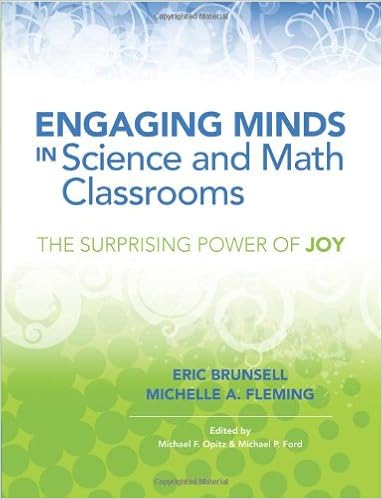
By Aaron V. Cicourel, Kenneth H. Jennings and Sybillyn H. M. Jennings (Auth.)
Read Online or Download Language Use and School Performance PDF
Similar education & teaching books
Eric Brunsell's Engaging Minds in Science and Math Classrooms: The PDF
We elect, each day, no matter if we will flip scholars on or off to technology and arithmetic in our school rooms. day-by-day judgements approximately find out how to comprise creativity, selection, and autonomy necessary elements of engagement can construct scholars self-efficacy, retain them inspired, and increase their identities as scientists and mathematicians.
Poetic Inquiry II – Seeing, Caring, Understanding: Using - download pdf or read online
This quantity deals a singular number of overseas works at the use of poetry in inquiry that transcends traditional disciplinary obstacles. the purpose is to demonstrate an 'aesthetic circulate' in social sciences and particularly in future health and in schooling. the gathering builds a bridge among the humanities and overall healthiness and schooling by way of supplying cutting edge exemplars of use of poetry in social technological know-how learn and within the context of the numerous various disciplinary contexts.
Extra resources for Language Use and School Performance
Sample text
The activities tacitly embody for the teachers developmental require ments and signify to her different levels of the students' abilities. The teacher's practical interest and task are the 40 AD HOCING IN THE SCHOOLS location and identification of the students' abilities to form ability groups of homogeneous students. From her perspective as determined by these practical circum stances and practical interests, the child is not just playing but is behaving in ways that provide evidence of his abilities.
In the next interview segment a teacher is asked to justify her placement of a particular student in the junior-first grade class. What were your reasons for putting him into junior-first as opposed to first. things. TEACHER: Well it takes him longer to learn Umm humrrij I see. INT. : letters TEACHER: It takes him longer to learn and sounds and this kind of thing. But it oould be just because he 's the youngest you know. It's just another year for him to acquire — I don't believe in junior-first but since we have it there I have to put somebody in i t .
The student convinces her that he recognizes the task by being able to name the parts that are missing from the drawing. The teacher has to evaluate the student's answer on the spot and has to decide whether or not the student really knows what is going on. That decision process involves the 'expansion' elicitation practice. The expansion Teacher: A one-legged monkey with one ear huhh? is formed by combining two previous utter ances by the student, It looks like a one-legged monkey and Yeh an' one ear.


